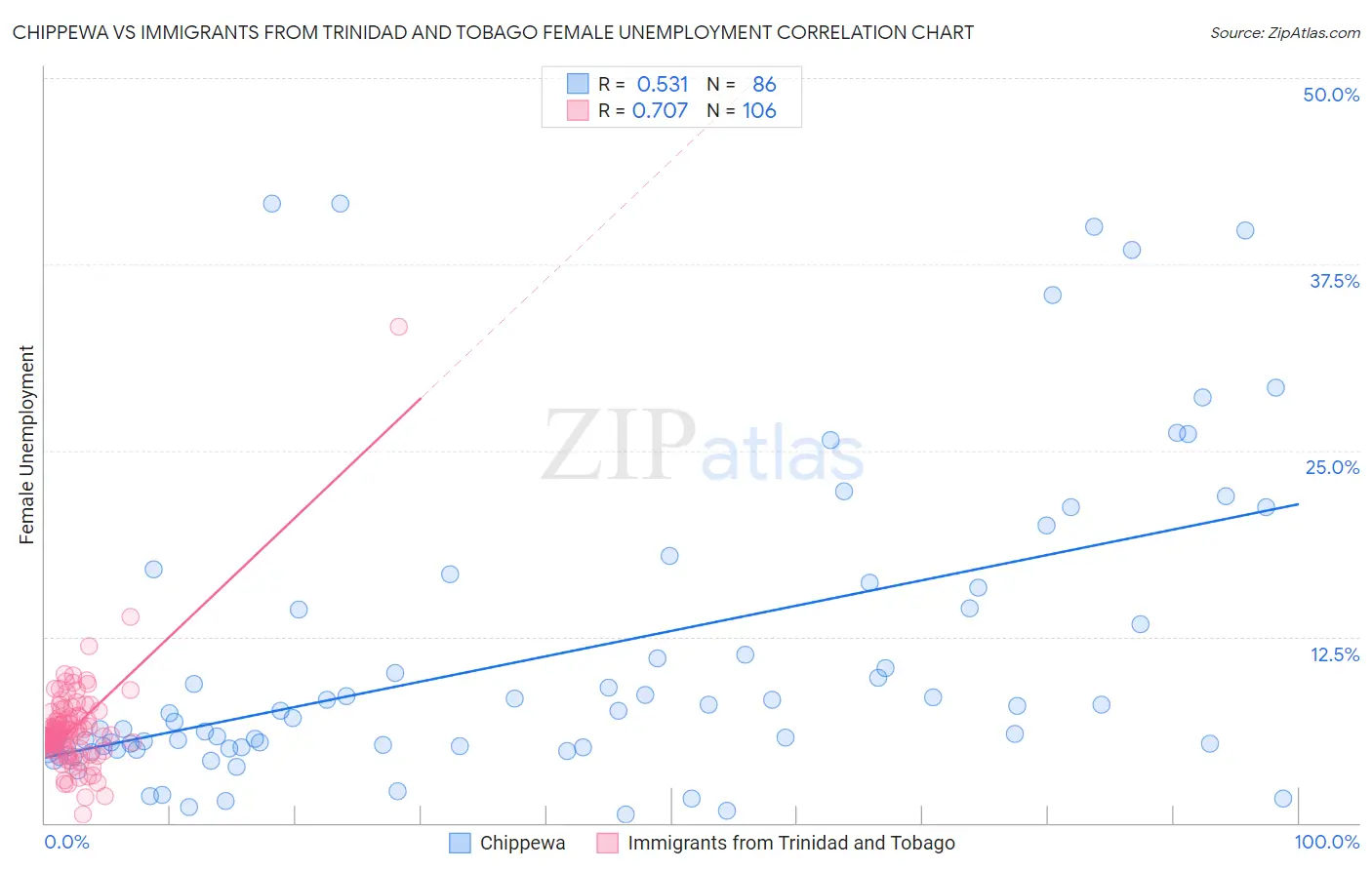Chippewa vs Immigrants from Trinidad and Tobago Female Unemployment
COMPARE
Chippewa
Immigrants from Trinidad and Tobago
Female Unemployment
Female Unemployment Comparison
Chippewa
Immigrants from Trinidad and Tobago
6.1%
FEMALE UNEMPLOYMENT
0.0/ 100
METRIC RATING
286th/ 347
METRIC RANK
6.1%
FEMALE UNEMPLOYMENT
0.0/ 100
METRIC RATING
292nd/ 347
METRIC RANK
Chippewa vs Immigrants from Trinidad and Tobago Female Unemployment Correlation Chart
The statistical analysis conducted on geographies consisting of 213,753,903 people shows a substantial positive correlation between the proportion of Chippewa and unemploymnet rate among females in the United States with a correlation coefficient (R) of 0.531 and weighted average of 6.1%. Similarly, the statistical analysis conducted on geographies consisting of 223,166,335 people shows a strong positive correlation between the proportion of Immigrants from Trinidad and Tobago and unemploymnet rate among females in the United States with a correlation coefficient (R) of 0.707 and weighted average of 6.1%, a difference of 0.31%.

Female Unemployment Correlation Summary
| Measurement | Chippewa | Immigrants from Trinidad and Tobago |
| Minimum | 0.60% | 0.60% |
| Maximum | 41.6% | 33.3% |
| Range | 41.0% | 32.7% |
| Mean | 11.2% | 6.3% |
| Median | 7.2% | 5.8% |
| Interquartile 25% (IQ1) | 5.1% | 5.0% |
| Interquartile 75% (IQ3) | 14.4% | 7.1% |
| Interquartile Range (IQR) | 9.3% | 2.0% |
| Standard Deviation (Sample) | 10.3% | 3.3% |
| Standard Deviation (Population) | 10.2% | 3.3% |
Demographics Similar to Chippewa and Immigrants from Trinidad and Tobago by Female Unemployment
In terms of female unemployment, the demographic groups most similar to Chippewa are Immigrants from Cabo Verde (6.1%, a difference of 0.030%), Immigrants from Guatemala (6.1%, a difference of 0.030%), Haitian (6.1%, a difference of 0.070%), Trinidadian and Tobagonian (6.1%, a difference of 0.080%), and Immigrants from Caribbean (6.1%, a difference of 0.14%). Similarly, the demographic groups most similar to Immigrants from Trinidad and Tobago are Immigrants from West Indies (6.1%, a difference of 0.060%), Mexican (6.1%, a difference of 0.080%), Immigrants from Caribbean (6.1%, a difference of 0.17%), Immigrants from El Salvador (6.1%, a difference of 0.18%), and Trinidadian and Tobagonian (6.1%, a difference of 0.23%).
| Demographics | Rating | Rank | Female Unemployment |
| Armenians | 0.0 /100 | #279 | Tragic 6.0% |
| Mexican American Indians | 0.0 /100 | #280 | Tragic 6.0% |
| Guatemalans | 0.0 /100 | #281 | Tragic 6.0% |
| Colville | 0.0 /100 | #282 | Tragic 6.0% |
| Salvadorans | 0.0 /100 | #283 | Tragic 6.0% |
| Immigrants | Senegal | 0.0 /100 | #284 | Tragic 6.1% |
| Immigrants | Cabo Verde | 0.0 /100 | #285 | Tragic 6.1% |
| Chippewa | 0.0 /100 | #286 | Tragic 6.1% |
| Immigrants | Guatemala | 0.0 /100 | #287 | Tragic 6.1% |
| Haitians | 0.0 /100 | #288 | Tragic 6.1% |
| Trinidadians and Tobagonians | 0.0 /100 | #289 | Tragic 6.1% |
| Immigrants | Caribbean | 0.0 /100 | #290 | Tragic 6.1% |
| Immigrants | West Indies | 0.0 /100 | #291 | Tragic 6.1% |
| Immigrants | Trinidad and Tobago | 0.0 /100 | #292 | Tragic 6.1% |
| Mexicans | 0.0 /100 | #293 | Tragic 6.1% |
| Immigrants | El Salvador | 0.0 /100 | #294 | Tragic 6.1% |
| Immigrants | Latin America | 0.0 /100 | #295 | Tragic 6.1% |
| Alaskan Athabascans | 0.0 /100 | #296 | Tragic 6.1% |
| West Indians | 0.0 /100 | #297 | Tragic 6.1% |
| Jamaicans | 0.0 /100 | #298 | Tragic 6.1% |
| Ute | 0.0 /100 | #299 | Tragic 6.1% |